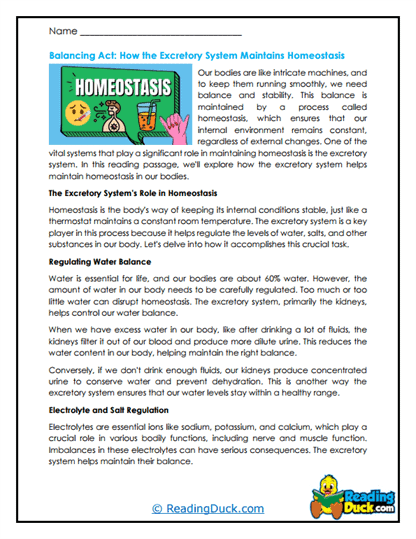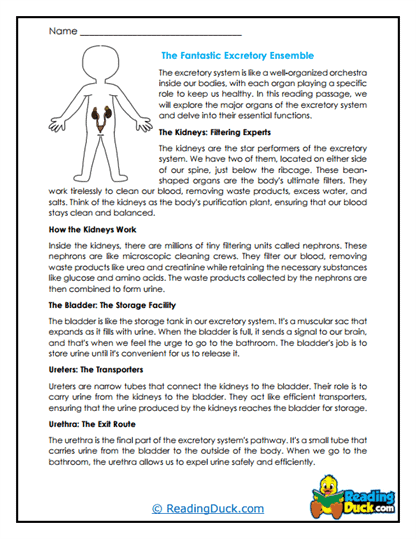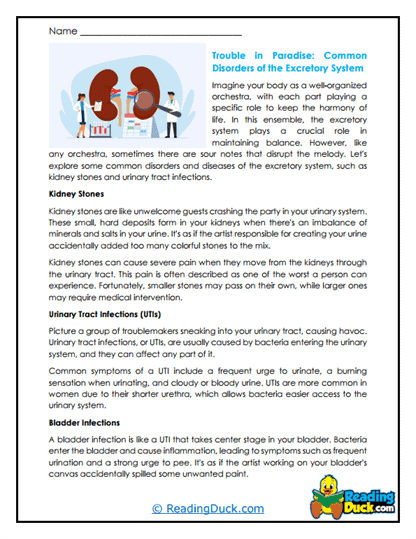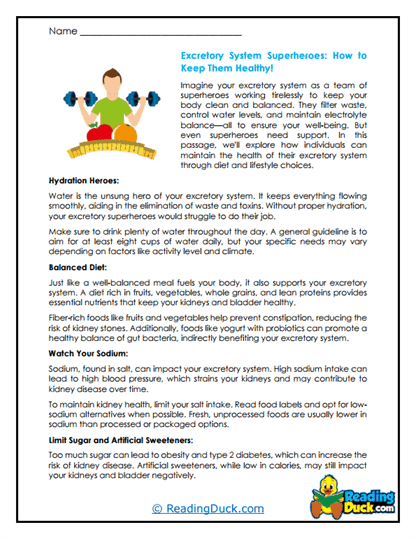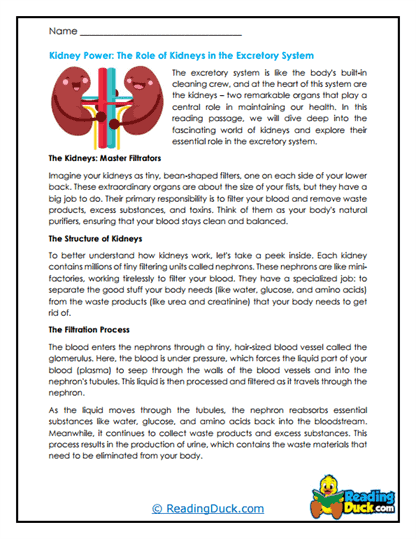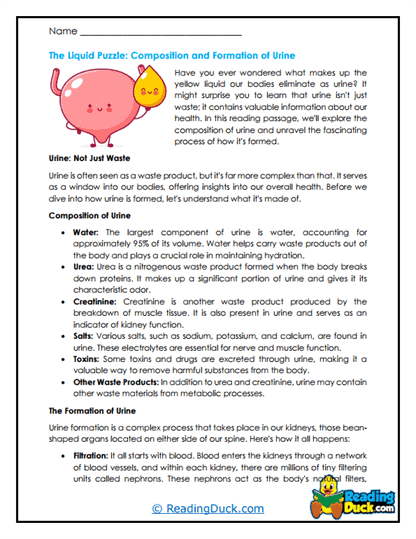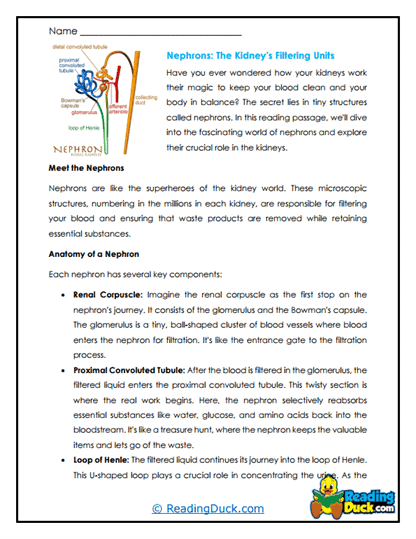Excretory System Worksheets
About Our Excretory System Worksheets
Our Excretory System worksheets offer a comprehensive and engaging exploration of one of the most crucial systems in the human body. As a subtopic under the broader Human Body category in Science: Biology, this collection delves into the various components and functions of the excretory system, which is responsible for removing waste products and maintaining the body’s internal balance. These worksheets are designed to enhance students' understanding of how the excretory system works, its importance in overall health, and the ways in which it interacts with other bodily systems.
This collection contains several worksheet sets, each focusing on different aspects of the excretory system. Each worksheet set includes:
- Multiple Choice Questions: These questions test students' comprehension of the reading material, ensuring they grasp the key concepts and details presented.
- Short Answer Questions: This section prompts students to express their understanding in their own words, reinforcing their knowledge and improving their ability to communicate scientific information effectively.
- Open-Ended Questions: These questions encourage students to share their personal thoughts, opinions, and reflections on the material, fostering deeper engagement and critical thinking.
Each worksheet is accompanied by an answer key, making it easy for educators and parents to review students' work. The worksheets are available in PDF format, ensuring they can be easily viewed electronically, downloaded, and printed out for use in various educational settings.
Understanding the Excretory System: The Body’s Waste Management System
The excretory system is vital for maintaining the body's internal environment by removing waste products and regulating essential processes like fluid balance, electrolyte levels, and blood pressure. When teaching students about the excretory system, it's important to emphasize how this system ensures that the body functions optimally by eliminating toxins and excess substances. Here’s a detailed breakdown of the key components and functions of the excretory system:
Kidneys: The Body’s Filtration Units: The kidneys are the primary organs of the excretory system, responsible for filtering blood and producing urine.
- Nephrons: The Functional Units of the Kidney: Each kidney contains millions of nephrons, the microscopic structures where filtration occurs. Students will learn how nephrons filter waste products, excess ions, and water from the blood to form urine.
- Glomerular Filtration: This process involves the filtration of blood in the glomerulus, a tiny cluster of capillaries in each nephron. The filtrate then passes through the renal tubules, where important substances like glucose, salts, and water are reabsorbed, and waste is concentrated into urine.
- Regulation of Blood Pressure and Volume: The kidneys play a critical role in maintaining blood pressure and blood volume by adjusting the amount of water and salt reabsorbed. This regulation is essential for overall cardiovascular health.
Ureters, Bladder, and Urethra: The Urinary Tract: After urine is produced in the kidneys, it travels through the urinary tract to be expelled from the body.
- Ureters: The ureters are muscular tubes that carry urine from the kidneys to the bladder. Students will explore how peristalsis (wave-like muscle contractions) moves urine through the ureters.
- Bladder: The bladder is a hollow, muscular organ that stores urine until it is ready to be expelled. Students will learn about the structure of the bladder, its capacity, and how it signals the brain when it’s time to urinate.
- Urethra: The urethra is the final passageway through which urine exits the body. Students will understand the role of the urethral sphincters in controlling the release of urine.
Skin, Lungs, and Liver: Supporting Organs in Excretion: While the kidneys and urinary tract are the primary components of the excretory system, other organs also contribute to waste removal.
- Skin: The skin plays a role in excretion by releasing sweat, which contains water, salts, and a small amount of urea. Students will explore how sweating helps regulate body temperature and remove certain waste products.
- Lungs: The lungs expel carbon dioxide, a waste product of cellular respiration, during exhalation. Understanding this process helps students appreciate the respiratory system’s role in maintaining the body’s acid-base balance.
- Liver: The liver is involved in detoxifying harmful substances and producing bile, which aids in the digestion and excretion of fats. Students will learn how the liver processes toxins and converts ammonia (a byproduct of protein metabolism) into urea, which is then filtered out by the kidneys.
Homeostasis and the Excretory System: The excretory system is essential for maintaining homeostasis, the body's stable internal environment.
- Regulation of Electrolytes: The kidneys regulate the levels of electrolytes, such as sodium, potassium, and calcium, which are vital for nerve function, muscle contraction, and overall cellular activity.
- Acid-Base Balance: The kidneys help maintain the body's pH by excreting hydrogen ions and reabsorbing bicarbonate from urine. This process is crucial for preventing conditions like acidosis or alkalosis, which can disrupt normal bodily functions.
- Fluid Balance: By adjusting the amount of water reabsorbed or excreted, the kidneys help maintain the body’s fluid balance. Students will understand how this balance is vital for blood pressure regulation and overall health.
Disorders of the Excretory System: Imbalances or malfunctions in the excretory system can lead to various health issues.
- Kidney Stones: These are solid deposits of minerals and salts that form in the kidneys and can cause severe pain. Students will learn about the causes, symptoms, and prevention of kidney stones.
- Urinary Tract Infections (UTIs): UTIs occur when bacteria infect the urinary tract, leading to symptoms like pain during urination and frequent urges to urinate. Understanding UTIs helps students learn about the importance of hygiene and staying hydrated.
- Kidney Disease: Chronic kidney disease (CKD) is a condition where the kidneys gradually lose function, leading to the buildup of waste products in the body. Students will explore the causes, symptoms, and treatments for CKD, and the importance of early detection.
By studying these aspects of the excretory system, students gain a comprehensive understanding of how their bodies manage waste and maintain internal balance. The worksheets help break down complex processes into understandable and engaging content, fostering curiosity and a deeper appreciation for the excretory system’s role in overall health.
Using These Worksheets In Class
Here are three creative ideas on how teachers and parents can use these Excretory System worksheets in school or in a homeschool setup:
- Create a 3D Model of the Urinary System: Students can create a 3D model of the urinary system using materials like clay, cardboard, or even digital tools. Using the worksheets as a guide, students can label the kidneys, ureters, bladder, and urethra, and explain how urine is formed and expelled from the body. This hands-on project reinforces their understanding of the excretory system's anatomy and functions.
- Interactive Kidney Function Simulation: Organize a classroom activity where students simulate kidney filtration using simple materials like coffee filters, water, and small solids (e.g., sand, salt). The worksheets can provide the scientific background, and students can record their observations on how the “kidney” filters the “blood” and removes “waste” while retaining essential “nutrients.”
- Case Study Discussions on Excretory System Disorders: Use the open-ended questions from the worksheets to facilitate discussions about real-life excretory system disorders. Present case studies of conditions like kidney stones, UTIs, or chronic kidney disease, and have students analyze the symptoms, causes, and treatment options. This activity not only reinforces their understanding of the excretory system but also encourages empathy and critical thinking.
The Importance of Understanding the Excretory System
Understanding the excretory system is crucial for students on both an academic and personal level. Academically, it provides a foundation for advanced studies in biology, medicine, and health sciences. It also enhances critical thinking skills as students explore how the excretory system interacts with other systems in the body, such as the circulatory and respiratory systems.
On a personal level, knowledge of the excretory system empowers students to make informed decisions about their health. Understanding how their bodies remove waste and maintain balance helps them appreciate the importance of hydration, a balanced diet, and regular health check-ups. This awareness can lead to healthier lifestyle choices and a better understanding of how to care for their bodies.
Overall, these Excretory System worksheets offer a valuable resource for educators and students alike, providing a detailed and engaging exploration of one of the most essential systems in the human body.
